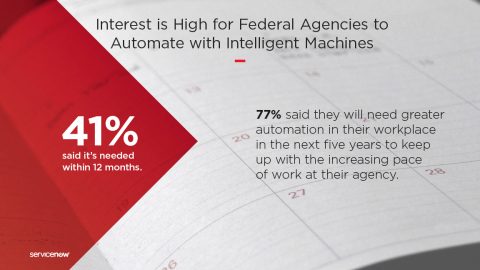41% of Federal Agencies Need to Automate Work with Intelligent Machines in Next Year, ServiceNow Survey Shows
Top time-wasting tasks: emailing requests and approvals, updating spreadsheets, hand delivering files
This press release features multimedia. View the full release here: http://www.businesswire.com/news/home/20171012005503/en/

Fed agencies waste time on routine manual tasks and need greater automation to get work done
- 77% said they will need greater automation in their workplace in the next five years to keep up with the increasing pace of work at their agency. 41% said it is needed within 12 months.
- 77% spend more than a quarter of their workday on manual administrative tasks.
- The top three manual tasks performed at work are emailing updates, requests or approvals (87%), and updating spreadsheets (78%) and electronic documents and forms (77%).
- Interestingly, a third of the respondents still hand deliver paper files to others.
“Fed agencies are approaching the breaking point,” said
For ServiceNow’s recommendations on how to make everyday work more efficient, read this blog post.
Interest is high for federal agencies to automate with intelligent machines
- Most respondents (65%) indicated that their agency is currently using or considering an intelligent automation solution, but a quarter (24%) are not sure of the timeframe.
- Fewer than 1 in 5 (18%) are currently using advanced automation.
- Laggards outnumber the early adopters: 35% say they are not considering it or do not know.
“While it is early days for federal agencies to invest in machine learning, the need is there to remove obstacles to productivity,” said Osborn. “Federal audiences have interest in exploring this area and identifying how they best can apply it to their operations.”
Areas that can benefit most from intelligent automation to everyday work
- The survey identified IT service management as the most automated agency process (58%) today. 42% of respondents indicate HR services are at least somewhat automated in their agency. The least automated service was resolving customer issues (28%).
- More than half indicated that intelligent automation would be very beneficial for the creation of real-time performance reports and analytics—the top area. 43% identified IT service desks and 39% identified resolving security threats.
- 6 in 10 agreed on the top four benefits of automation: accuracy, cost reduction, less time spent on tasks, and freeing up staff to focus resources on value-added tasks.
“While much of the federal world is highly manual, there are bright spots in IT services,” Osborn said. “Greater automation can drive more accurate and speedy work.”
Replacing existing legacy tools is the #1 barrier to the adoption of intelligent automation
- The top concern in adopting more advanced automation was being forced to replace existing legacy technology that they had been heavily invested in. 42% cited that would significantly impact their agency’s planning efforts to integrate and achieve intelligent automation.
- Cost and staffing also posed concerns: 39% said the uncertainty around funds/budget is a significant concern, and 36% said their current staff don’t have the proper training to support these new technologies once implemented.
- Potential job eliminations and layoffs landed at the bottom of the list of concerns (21%).
“Although government leaders and key IT policy makers have emphasized the benefits of adopting modern technology, many agencies are still clinging on to their legacy tools and don’t fully understand the advantages of using advanced automation,” said Osborn. “Federal agencies need to look at how the private sector is using advanced automation today and how they are able to cope with the rising volume of work.”
Respondents agree that not modernizing manual processes will have a negative impact on work
- 66% of respondents said human error will increase.
- 57% said maintaining legacy systems will be costly.
- 55% said reduced productivity will continue.
Tweet: New #ServiceNow survey shows that 41% of federal agencies need to automate work with intelligent machines in next year http://bit.ly/2i1lsaq #GovIT
Survey Methodology
About
©2017
View source version on businesswire.com: http://www.businesswire.com/news/home/20171012005503/en/
Source:
Media Contact:
ServiceNow
Woodrow Mosqueda, 669-262-2160
press@servicenow.com
or
Investor
Relations Contact:
ServiceNow
Jimmy Sexton, 805-453-8566
ir@servicenow.com